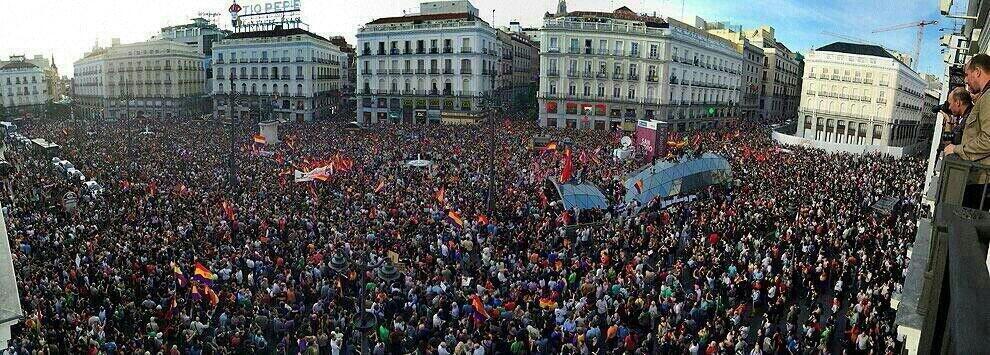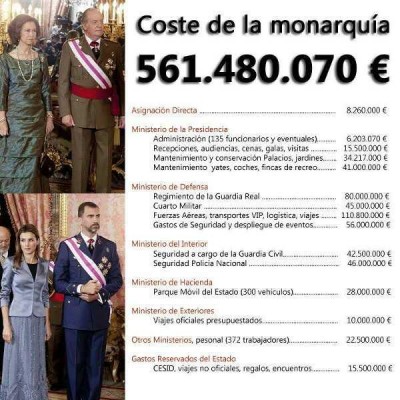
View of Puerta del Sol (Madrid) during the demonstration on June 2. Photo uploaded to Twitter by Danips.
Monday, June 2, 2014, will go down in Spain's history as the day that King Juan Carlos I abdicated his throne. According to his own words, “A new generations is claiming the leading role (…). Today, a younger generation deserves to move to the frontline.” Within hours, hundreds of thousands of citizens hit the streets throughout the country calling for a referendum that would allow them to decide whether to keep the monarchy or to replace it with a republic in which they could elect a head of state.
Many observers see the crown's attempt to maintain the monarchical system in this abdication, and consider the fact that it is taking place while a conservative party governs Spain with an absolute majority to be a move to ensure that the succession is carried out smoothly.
But the feeling on the street seems to be quite different. Following the abdication, social networks witnessed an avalanche of comments that broke all records. Together with hashtags like #ElReyAbdica (#TheKingAbdicates) and #VivaElRey (#LongLiveTheKing), others like #IIIRepublica (#IIIRepublic), #EligeTuRey (#ChooseYourKing), #ProcesoConstituyente (#ConstituentProcess), #AporLaTercera (#FortheThird) and #ReferendumYA (#ReferendumNOW) began to stand out and became Trending Topics practically all day. Of these, #ElReyAbdica, #IIIRepublica, #AporLaTerceraRepublica and “Felipe VI” were TT worldwide.
Es hora de hacer historia queremos + democracia #ElReyAbdica #ReferendumYA #QueElPuebloHable #APorLaTerceraRepublica pic.twitter.com/8NAC3mj6Qf
— José Manuel Corrales (@JoseMCorrales) June 2, 2014
It's time to make history, we want + democracy
Si es cierto que “La soberanía nacional reside en el pueblo español”, ¿por qué el Rey puede abdicar en favor de alguien? #ElReyAbdica
— Luis Miguel Artabe (@lmartabe) June 2, 2014
If it's true that “National sovereignty resides with the Spanish people”, why can the King abdicate in favor of someone?
Discurso del rey. Dice que apostó porque los ciudadanos “eligiesen su propio destino”. A su hijo nos lo impone sin votarle #elreyabdica
— Ángel Calleja (@angelcalleja) June 2, 2014
The King's Speech. Says he bet on citizens “choosing their own destiny.” He imposed his son on us without voting for him.
On Change.org, two petitions were created to ask for a referendum on the monarchy which reached more than 23,000 [es] and 15,000 [es] signatures, respectively, after one day of being opened. Another petition on Avaaz.org [es] exceeded 265,000 signatures at the time of writing this article.
The decline in the king's popularity has been increasingly evident in recent years, as shown by the chart that accompanies this tweet from Europa press [es]:
Así ha evolucionado la nota de los ciudadanos a la Monarquía desde los 90 http://t.co/0OT96yx833 #ElReyAbdica pic.twitter.com/NyhGIhhjZe
— Europa Press (@europapress_es) June 2, 2014
This is how the citizens’ view of the monarchy has evolved since the 90s
Undoubtedly, the scandals that have hit the royal family head on in recent years have contributed to this drastic loss of support from the people: the trial of the king's son-in-law, Iñaki Urdangarín, the charges against Princess Cristina in the same case, the luxurious hunting trips in times of crisis, the appearance of the king's alleged mistress, Corinna zu Sayn-Wittgenstein, who used an extravagantly decorated house belonging to the National Heritage [es]… Although the Spanish monarchy happens to be one of the least expensive in the world, in recent months there have been rumors about the king's personal fortune, which NBC calculates to be more than 2 billion euros:
Thirty-nine years after he took the throne, the outgoing king is now seen as a man deeply out-of-touch with the social landscape of post-economic-meltdown Spain.
Some estimate the king's worth could exceed 2 billion euro, a galling sum for a country that has been one of the hardest hit in Europe by the financial crisis.
Some estimate that the king's assets could surpass 2 billion euros, an offensive figure for a country that has been one of those hit hardest by the financial crisis in Europe.
The king's friendship with big entrepreneurs and bankers – some jailed for corruption –, quite favored by the king's official travels [es] around the world in search of business opportunities for the elite, has also been criticized. A few months ago, the role of the crown in the transition was also questioned following the publication of a book entitled “The great forgetfulness” by Pilar Urbano, in which the journalist claimed that the attempted military coup on February 23, 1981 was organized by the king himself [es] to win the loyalty of the Spanish people.
Spanish citizens also disagree with the opacity surrounding the monarchical institution, not required to detail accounts under the new transparency law [es]. The constitution states that “The King's person is inviolable and not subject to liability,” meaning he cannot be held accountable for any of his actions, which becomes difficult to understand in a democracy, as is the new Judiciary Law that grants the condition of immunity to the queen and the until the moment princes of Asturias.
For many Spaniards, the fact that the Constitution has not been amended since its adoption in 1978 is a testament to the stagnation of the Spanish political class – including the monarchy – and its remoteness from the citizens. Andrés Gil [es] expresses it as such on eldiario.es:
La Constitución de 1978 responde a 1978. Pero 2014 ya no es 1978. (…) Una ciudadanía que se organiza, debate y hace política, principalmente sin partidos, y que este lunes ha salido a la calle en toda España para pedir un referéndum sobre el modelo de Estado mientras los políticos dominantes se aferran a los jirones del régimen de 1978.
The Constitution of 1978 responds to 1978. But 2014 is no longer 1978. (…) A citizenry that organizes itself, debates, and creates policy, mainly without parties, and has taken to the streets across all of Spain this Monday to demand a referendum on the state model while dominant politicians cling to the shreds of the 1978 regime.
And jhr cronos wrote the following on the MACanime forum [es]:
(…) El fin de la monarquía debe darse por la idea en sí misma, porque es una desfachatez tener un rey por supuesto derecho divino (o el dedo del dictador Franco en el caso español), y es una tontería que se vaya heredando el asunto, como si fueran sangre azules que siempre nacen adecuados para ser dirigentes o reyes.
Yo no sé si sea ahora cuando se empiece a abolir la monarquía española, pero de que se abolirá ténganlo por seguro. La república volverá y terminarán con ese legado de oscurantismo que debió caer cuando el siglo de las luces. (…)
(…) The end of the monarchy should come about by the idea in and of itself, because it is an affront to have a king by a supposed divine right (or the finger of dictator Franco in the Spanish case), and it is silly for for it to be inherited, as if they were all blue bloods that are always born suitable to be leaders or kings.
I don't know if the Spanish monarchy will start being abolished now, but abolishing it is surely the way to go. The republic will return and this legacy of darkness that should have fallen during the Age of Enlightenment will end (…)
The demonstrations calling for a referendum on the state model have not ended just yet: new protests will be held this weekend [es].







